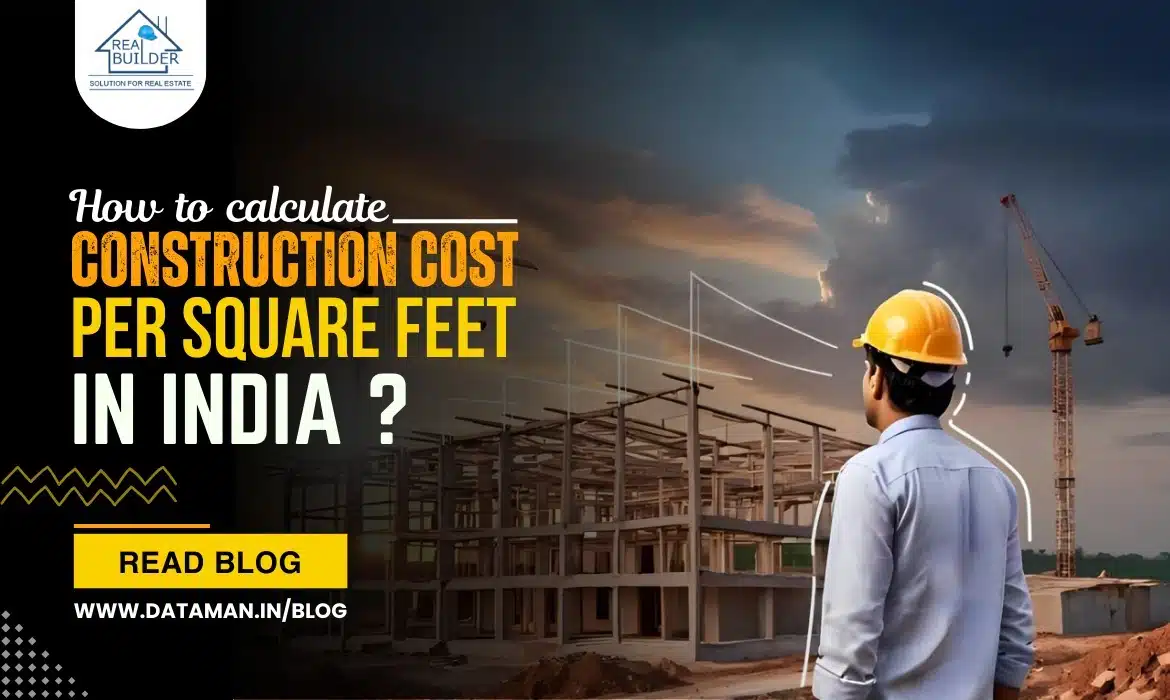- +91 9511117684
- shweta@dataman.in

Table of Contents
Post Views: 9,713
Estimating the construction cost per square feet in India is crucial for project planning, budgeting, and ensuring a smooth construction process. Whether you’re a contractor or an individual building your own home, knowing how to accurately calculate these costs will help you avoid unexpected financial surprises.
This guide will break down the various factors that influence construction costs, covering both material and labour charges, and the typical rates for house construction per square feet in India.
But before diving into the numbers, let’s go through the stages of house construction and understand how costs accumulate at each step.
Stages of House Construction in India
Building a house is a multi-stage process, each involving different materials, labour, and equipment. Here’s a high-level overview of the stages involved:
Home Design and Approval
The first stage of house construction involves creating a detailed architectural design for the house. This includes planning the layout of rooms, placement of doors and windows, and considering both functional and aesthetic aspects. Once the design is finalized, it must be submitted to the local governing authorities for approval.
Excavation
The second stage begins with excavation work. This involves preparing the construction site by clearing the land of any debris, vegetation, or existing structures. Surveyors are brought in to accurately mark the layout of the house on the plot, ensuring that it aligns with the approved plan. The ground is then excavated to the required depth, where the foundation of the house will be placed.
Footing & Foundation
The footing and foundation are essential for distributing the weight of the house evenly across the soil. In this stage, trenches are dug based on the structural plan, and concrete footings are poured. Depending on the design, the foundation could be a slab, crawl space, or full basement.
RCC Work (Columns & Slabs)
Reinforced Cement Concrete (RCC) work is the framework of the building. It involves constructing vertical columns and horizontal slabs that form the skeleton of the house. These columns are reinforced with steel bars, making them strong enough to bear the load of the entire structure. The slabs, typically made of concrete, form the floors of the building.
Brickwork and Plastering
In this stage, the external and internal walls of the house are built using bricks or concrete blocks. Skilled masons carefully align and bond the bricks with mortar to ensure the walls are straight, level, and strong. Once the walls are completed, plastering begins, which involves applying a smooth layer of cement or gypsum-based material to the surfaces.
Roof Slab
Once the walls and columns are in place, the roof slab is constructed. This involves pouring concrete over a formwork to create a flat, solid roof. Steel reinforcement bars are used within the slab to enhance its strength and durability.
Flooring and Tiling
Flooring involves laying down a base material, such as cement or screed, followed by the final floor finish, which could be tiles, marble, wood, or any other material chosen by the homeowner. Tiling is also done on walls, especially in areas like kitchens and bathrooms.
Electric Wiring
Laying down the electrical systems is a critical phase, as it ensures the house will have power and connectivity. Electricians begin by installing conduits, which are tubes or pipes that protect the electrical wiring. These are embedded within the walls and ceilings before they are plastered.
Water Supply & Plumbing
The installation of plumbing systems takes place alongside electrical work. Plumbers lay out the pipes for water supply, drainage, and sewage systems. These pipes run within the walls and under the flooring, connecting to fixtures like sinks, showers, and toilets. In addition to water supply, this stage includes the installation of gas lines, if required.
Doors & Windows:
The final structural phase involves fitting doors and windows. Depending on the design, these could be made of wood, metal, UPVC, or other materials. Frames for doors and windows are installed first to ensure they are properly aligned and secure. Afterward, the doors and windows themselves are fitted into place.
Construction Cost Per Square Feet in India
The cost of construction per square foot in India varies widely depending on several factors such as location, the type of construction, materials used, labour costs, and the complexity of the project. On average, the cost can range from ₹1,500 to ₹4,500 or more per square foot. Here’s a detailed breakdown of how construction costs differ across different categories:
1. Basic Construction (Economy Class)
For a simple, no-frills construction, typically using standard materials and basic finishes, the cost can range from ₹1,500 to ₹2,500 per square foot. This type of construction includes budget-friendly materials like cement, brick, and standard tiles. It’s a good option for people looking to build a functional home without too many luxury elements.
2. Standard Construction (Mid-Range)
For a more moderate construction with better finishes, such as higher-quality tiles, premium paints, and better-quality doors and windows, the cost typically ranges from ₹2,500 to ₹3,500 per square foot. This type of construction often includes more attention to design details, and some customization for layout and finishes, providing a good balance between cost and quality.
3. Luxury Construction (High-End)
High-end construction with premium materials, such as granite flooring, designer tiles, marble finishes, and advanced features like smart home technology or energy-efficient systems, can cost ₹3,500 to ₹4,500 per square foot or more. Luxury construction also includes custom architectural features, high-quality fittings, and more specialized work like landscaping or intricate interior designs.
Also Read: Top 5 Best Cement in India with Latest Cement Bag Prices
Construction Cost Per Square Feet in India by Stages
Let’s take a closer look at the costs involved at each stage of house construction:
1. Home Design and Approval
– Cost: ₹50,000 – ₹2,00,000 (depending on the size of the house and architectural complexity). This is a one time cost
2. Excavation
– Cost: ₹30 – ₹60 per cubic foot for manual labour or machinery hire.
3. Footing & Foundation
– Cost: ₹200 – ₹500 per sq. ft. (includes cement, steel, and labour)
4. RCC Work (Columns & Slabs)
– Cost: ₹400 – ₹700 per sq. ft. (includes steel, concrete, and labour)
5. Roof Slab
– Cost: ₹450 – ₹800 per sq. ft.
6. Brickwork and Plastering
– Cost: ₹200 – ₹400 per sq. ft.
7. Flooring and Tiling
– Cost: ₹40 – ₹250 per sq. ft. (depending on tile quality)
8. Electric Wiring
– Cost: ₹50 – ₹200 per sq. ft. (depending on wiring and fittings used)
9. Water Supply & Plumbing
– Cost: ₹50 – ₹150 per sq. ft.
10. Doors & Windows
– Cost: ₹200 – ₹1,200 per sq. ft.
Now, let’s dive into calculating the cost per square foot for constructing a house in India.
First Floor Construction Cost Per Square Feet
When constructing a first floor, the construction cost per square feet varies based on several factors like location, materials used, and the type of construction (luxury vs. budget). Generally, first-floor construction tends to be costlier than ground-floor construction due to the extra materials needed for reinforcement and scaffolding.
Average Construction Cost Range:
For basic construction, the cost ranges from ₹1,400 to ₹1,800 per sq. ft.
For premium construction, costs could go from ₹2,000 to ₹3,000 per sq. ft.
These figures generally include both material and labour costs, but we’ll break it down further in the next sections.
Labour Cost for House Construction Per Sq Ft
Labour costs can vary widely depending on the location, complexity of the job, and the skills required. In India, labour typically accounts for 30% to 40% of the total construction cost.
Average Labour Costs in India (2024 estimates):
– Basic Construction: ₹400 – ₹600 per sq. ft.
– Premium Construction: ₹600 – ₹1,000 per sq. ft.
Types of labour involved include:
- Masons (for brickwork, plastering, and RCC)
- Carpenters (for door and window fittings)
- Electricians (for wiring)
- Plumbers (for water supply and sanitation systems)
These labour costs also depend on the city and state you’re building in, as labour charges in metro cities like Mumbai or Delhi can be higher compared to smaller towns.
Also Read: What is the Construction Linked Payment Plan (CLP)?
Construction Rate Per Square Feet with Material
When calculating the construction rate per square feet with material, you must consider the cost of the materials themselves. Here’s a breakdown of the most common materials used in house construction:
Key Materials:
– Cement: ₹300 – ₹450 per bag (50 kg)
– Steel: ₹50 – ₹80 per kg
– Bricks: ₹6 – ₹12 per brick
– Aggregate (crushed stone): ₹40 – ₹75 per cubic foot
– Sand: ₹40 – ₹80 per cubic foot
– Flooring (tiles): ₹40 – ₹250 per sq. ft.
– Doors & Windows: ₹200 – ₹1,200 per sq. ft. (depending on material and quality)
Total Cost Estimation (with materials):
For basic construction (using standard materials):
– ₹1,500 – ₹2,000 per sq. ft.
For premium construction (using high-end materials):
– ₹2,500 – ₹4,000 per sq. ft.
Construction Rate Per Square Feet Without Material
If you’re handling the procurement of materials separately, your construction cost will primarily focus on labour, equipment, and administrative fees.
Typical Costs Without Materials:
– Basic Construction: ₹500 – ₹800 per sq. ft.
– Premium Construction: ₹900 – ₹1,200 per sq. ft.
This rate typically includes:
– Labor charges for masonry, carpentry, and plastering.
– Construction equipment rental like scaffolding or mixers.
– Administrative costs such as approvals or inspections.
However, it’s essential to carefully plan this option, as managing material procurement can add complexity to the project timeline.
Also Read: Top 10 Construction Companies in India
Factors That Influence Construction Costs
Construction costs can fluctuate based on various factors:
1. Location: Construction in cities like Bangalore, Mumbai, or Delhi can be more expensive due to higher labour charges and material costs.
2. Material Quality: Opting for premium quality materials will naturally raise your construction rate.
3. Project Type: A simple, straightforward design will be less expensive compared to a custom luxury home.
4. Government Approvals: Obtaining permits and other approvals can vary in cost depending on your local government.
5. Site Conditions: If your site requires significant levelling or excavation, this will increase your overall cost.
Tips for Reducing Construction Costs
To keep your construction cost per square feet under control, consider the following:
1. Plan Thoroughly: Ensure that your home design and budget are clear before starting construction to avoid mid-project changes that could increase costs.
2. Buy in Bulk: Purchasing materials like steel, cement, and tiles in bulk can help you get a better price.
3. Opt for Local Materials: Where possible, use locally sourced materials, which are usually cheaper and easier to procure.
4. Negotiate Labour Rates: Get multiple quotations from contractors and negotiate for the best deal.
5. Use Construction Management Software: Implementing construction management software can help you track costs, schedule tasks, and manage your project more efficiently.
Also Read: What is Commercial Construction? A Deep Dive
Conclusion
Calculating the construction cost per square feet in India requires careful consideration of various factors, including material choices, labour, and the specific region you’re building in. By understanding the breakdown of costs at each construction stage, you’ll be better equipped to budget effectively and ensure your project stays on track.
FAQs
1. What is the average construction cost per square feet in India for 2024?
The average construction cost ranges between ₹1,500 – ₹2,000 per sq. ft. for basic construction and ₹2,500 – ₹4,000 per sq. ft. for premium construction.
2. Is it cheaper to buy materials yourself or go with a contractor package?
Buying materials yourself can be cheaper but requires good planning and time investment. Contractors usually charge higher but offer convenience.
3. How much does labour contribute to the total construction cost?
Labour typically accounts for 30-40% of the total construction cost.
1

